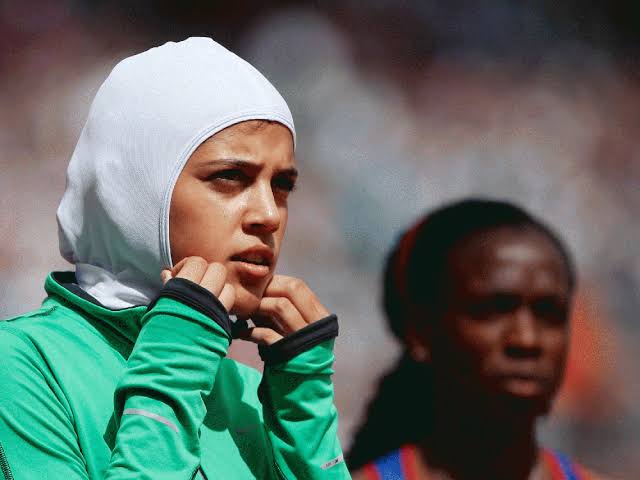Saudi Arabia’s sports landscape has witnessed historic changes in recent years, with female athletes gaining recognition on the global stage. One of the key figures in this transformation is Sarah Attar, a trailblazing middle-distance runner who made history as one of the first Saudi women to compete in the Olympics. Her participation in the 2012 London Games was more than just an athletic milestone—it symbolized progress, empowerment, and the breaking of long-standing barriers for women in Saudi sports.
Attar’s influence extends beyond her Olympic appearances. She has become a global icon for women’s empowerment, paving the way for a new generation of Saudi female athletes. With Saudi Arabia gradually embracing women’s participation in sports as part of its Vision 2030 goals, her story serves as a testament to perseverance, change, and the power of representation.
The Journey of Sarah Attar
Born in Escondido, California, in 1992, Sarah Attar was raised in a multicultural household. Her father, originally from Saudi Arabia, and her American mother provided her with a unique perspective on identity, culture, and sports. Growing up in the United States, she developed a love for running early in life, eventually competing in track events throughout her academic career.
Attar attended Pepperdine University in California, where she trained as a long-distance runner. Though she was not a professional athlete at the time of her Olympic debut, her determination and skill caught the attention of Saudi Arabian sports officials when they sought female athletes to represent the Kingdom at the 2012 London Olympics.
For decades, Saudi Arabia had not allowed women to participate in the Olympics due to cultural and societal restrictions. However, mounting international pressure from organizations like the International Olympic Committee (IOC) prompted the Kingdom to change its stance. This shift led to the selection of Sarah Attar and Wojdan Shaherkani (a judoka) as the first female athletes to compete for Saudi Arabia at the Olympics.
Making History at the 2012 London Olympics
When Sarah Attar stepped onto the track for the 800-meter race at the London Olympics, she made history. Wearing a modest uniform, including full-length leggings and a headscarf, she was a symbol of change in Saudi sports. Though she finished last in her heat, over 30 seconds behind the leader, the crowd erupted into applause, recognizing the significance of her participation.
Her presence alone was revolutionary. It was a moment that transcended athletics—it represented hope and progress for Saudi women. Attar later reflected on the experience, emphasizing how it was not just about winning but about opening doors for future generations of female athletes in Saudi Arabia.
Breaking Barriers for Women in Sports
Sarah Attar’s participation in the Olympics was a defining moment for Saudi women in athletics. Before her, female sports programs in Saudi Arabia were scarce, and women faced societal and institutional challenges when pursuing sports. Her Olympic run became a catalyst for change, inspiring young Saudi girls to explore their potential in athletics.
Following the London Olympics, Attar continued to advocate for women’s participation in sports, highlighting the importance of representation and inclusivity. She later competed in the 2016 Rio Olympics, further reinforcing her role as a pioneer in Saudi athletics.
The Evolution of Women’s Sports in Saudi Arabia

Before 2012, Saudi Arabia had one of the most restrictive policies regarding women’s participation in sports. Physical education for girls was not officially allowed in schools, and there were no professional sports leagues for women. Many women who wished to engage in athletics had to do so privately or abroad.
However, Sarah Attar’s Olympic appearance marked the beginning of change. After her participation, Saudi Arabia introduced several initiatives to encourage female sports:
- 2013: The Saudi government allowed girls to participate in physical education in private schools.
- 2016: The first-ever women’s sports department was established within the Saudi General Sports Authority.
- 2018: Saudi Arabia sent its first female team to the Asian Games.
- 2020: The Kingdom established its first official women’s football league.
Attar’s symbolic presence at the Olympics played a role in shifting public perception and encouraging these changes.
The Impact of Sarah Attar’s Legacy
Sarah Attar’s influence extends beyond her personal achievements. Since her groundbreaking Olympic appearance:
- Saudi Arabia has expanded opportunities for female athletes, including introducing women’s sports leagues and allowing women to participate in national and international competitions.
- More Saudi women have joined the Olympic stage, with increased participation in athletics, weightlifting, and other sports.
- Public attitudes toward women in sports have shifted, with greater acceptance and encouragement for female athletes in the Kingdom.
Her journey is a testament to the power of perseverance and the ability of sports to drive societal change.
A Second Olympic Appearance: 2016 Rio Games
Four years after her groundbreaking debut, Sarah Attar returned to the Olympic stage at the 2016 Rio Games. This time, she competed in the marathon event, marking another historic moment for Saudi women in athletics. Her participation symbolized progress, proving that Saudi female athletes were not just making appearances but were here to stay.
The inclusion of more Saudi women in the 2016 Olympics showed the continued evolution of the Kingdom’s approach to female sports participation. Attar’s presence, along with other Saudi women in different events, reinforced the message that barriers were breaking and that the future of Saudi sports would include women as key players.
Empowering the Next Generation
As Saudi Arabia continues its transformation under Vision 2030, which promotes gender equality in various sectors, Attar’s legacy serves as a foundation for future generations of female athletes. With increasing investments in women’s sports, scholarship programs, and professional leagues, the path for Saudi women in athletics is more promising than ever.
Mentorship and Advocacy
Beyond competing, Attar has used her platform to inspire young athletes. She has spoken at events, participated in campaigns promoting female sports, and continues to support the growing movement for women’s participation in athletics in Saudi Arabia.
Her story has been featured in global media, reinforcing the importance of visibility and role models in sports. Attar’s advocacy focuses on normalizing female participation in athletics, encouraging young Saudi girls to pursue their dreams without fear of societal limitations.
The Future of Saudi Women in Sports
The evolution of Saudi Arabia’s sports industry is still in progress, but the foundation laid by pioneers like Sarah Attar is undeniable. Looking ahead, the country aims to:
- Expand women’s participation in the Olympics and international competitions.
- Develop infrastructure and training programs for female athletes.
- Promote sports as a career option for women in Saudi Arabia.
Ongoing Challenges and Progress
Despite the significant progress, challenges remain. Social perceptions regarding female athletes continue to evolve, and there is still work to be done in terms of providing equal opportunities, resources, and recognition for women in sports. However, the trajectory is promising, with Saudi Arabia continuing to invest in the development of female sports programs and professional leagues.
With ongoing progress, the future of Saudi women’s athletics looks brighter than ever, paving the way for more success stories like Sarah Attar’s.
Conclusion
Sarah Attar’s legacy is one of courage and transformation. Her journey from an aspiring athlete to a global symbol of empowerment has redefined the role of women in Saudi sports. As more female athletes step into the limelight, her influence will continue to inspire future generations to push boundaries and achieve greatness.
Her participation in the Olympics was more than just a race—it was a movement. A movement that challenged norms, opened doors, and proved that sports have the power to drive meaningful societal change. Today, as Saudi Arabia embraces a more inclusive approach to athletics, Sarah Attar remains a pivotal figure in this revolution, ensuring that the next generation of Saudi female athletes has the support and opportunities they deserve.









